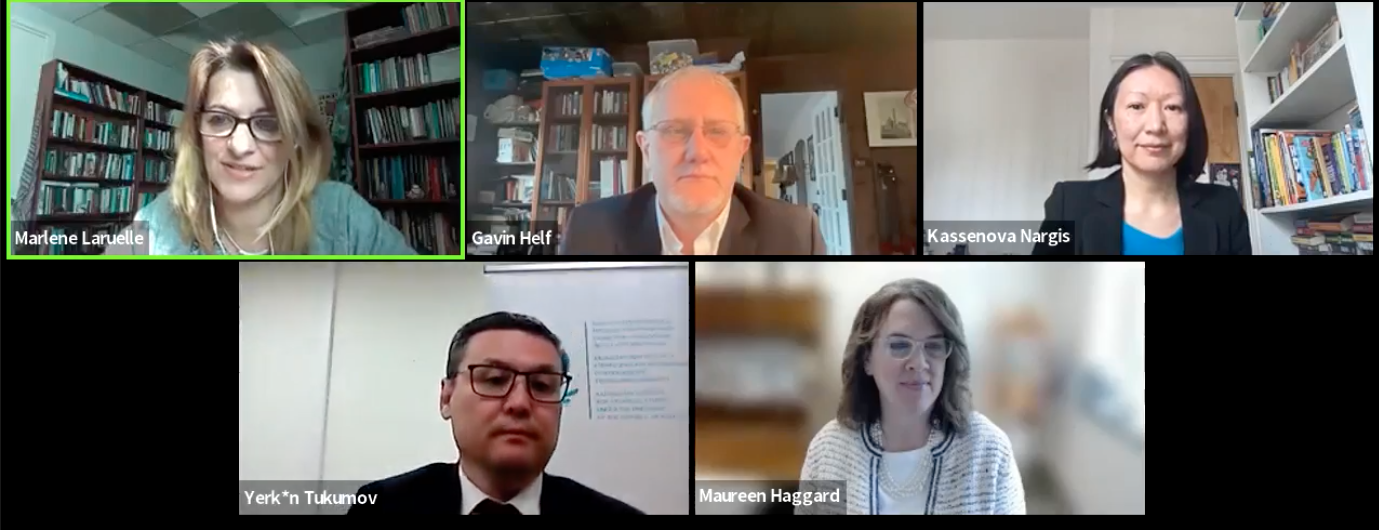WASHINGTON, D.C. – Top experts convened for a virtual round table on April 27 organized by the Central Asia Program (CAP) at George Washington University to discuss Kazakhstan’s political reforms.

Experts during the roundtable.
The round table titled Political Reforms in Kazakhstan in the Context of Geopolitical Shifts gathered Nargis Kassenova, Senior Fellow and Director of the Program on Central Asia at Davis Center for Russian and Eurasian Studies (Harvard University), Yerkin Tukumov, Director at Kazakhstan Institute for Strategic Studies, Gavin Helf, Senior Expert on Central Asia at the U.S. Institute of Peace and Maureen Haggard, Office Director Bureau of Democracy, Human Rights, and Labor at the U.S. Department of State.
They discussed the current state and trends in the transformation of Kazakh institutions, the political, social and economic significance of the President’s initiatives, and the prospects for the development of civil society institutions – all in light of the sweeping geopolitical changes in Eurasia related to Russia’s conflict with Ukraine.
For Kazakhstan, the beginning of the year was also grim with the unprecedented January riots that were a stress test for the country and the government.
The riots that eventually turned to violence forced the government to accelerate the reform agenda and led President Kassym-Jomart Tokayev to announce significant political reforms and the decision to accelerate systemic transformations.
In his speech, Yerkin Tukumov, noted the importance of profound changes in the internal political life of Kazakhstan.
“The unprecedented events of January were a great challenge to the stability of Kazakhstan’s political system. President Tokayev continued his course of political modernization and in his address on March 16, he announced major political reforms,” said Tukumov.
According to him, one of the main goals of the reforms is to distribute power between the branches, particularly the transfer of presidential powers to the Parliament. These goals are in line with continued efforts towards decentralization, demonopolization, and debureaucratization.
“It has been a long time since Kazakhstan, like many other transitional countries, has followed the forum economy before politics. However, as history has shown, not all countries with a high share of mineral resources in income were able to become sustainable and consistently implement the program of reforms. Therefore, for Kazakhstan now it is especially important to break its dependence on mineral commodities and move to systematically build strong democratic institutions,” he said.
The January events served as a catalyst for reforms, but demand for change, however, has been building up over the years, said Kassenova, with people having different kinds of grievances about the current state of politics in the country. Kassenova is a senior fellow and director of the Program on Central Asia at the Davis Center for Russian and Eurasian Studies at Harvard University, whose research has focused on Central Asian politics and security, and Eurasian geopolitics, among other areas.
“Full-fledged recognition of problems is one of the accomplishments of President Tokayev’s team. It is good that President Tokayev realizes the core things. He said that the January events were to some extent result of own domestic stagnation,” she told the virtual event.
Gavin Helf, who is a senior expert on Central Asia, said that Kazakhstan overcame what he described as a “dangerous part of the transition.”
“Economic grievances are manageable. The government has shown a quick response in addressing grievances over the price of liquid petroleum gas. Another good piece of news is that we didn’t see a lot of ideological violence. There were no nationalists or Islamists,” said Helf.
